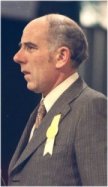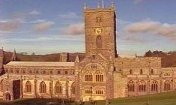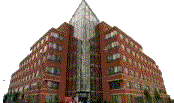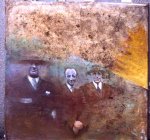
Eisteddfod Genedlaethol Cymru
Tyddewi - 2002
Eisteddfod Update
Language Politics
 Language politics were back on the Eisteddfod agenda again this year, starting at the end of June with the investiture of the new Archdruid who, in a hard hitting speech, immediately called for radical language rights. [1]
Language politics were back on the Eisteddfod agenda again this year, starting at the end of June with the investiture of the new Archdruid who, in a hard hitting speech, immediately called for radical language rights. [1]He reminded the Gorsedd of its fundamental role in safeguarding and promoting the Welsh language and of the need for it to speak out clearly and fearlessly when necessary.
"It was only by compulsion that they succeeded in decimating the Welsh language; it is only by compulsion that we shall restore it" he said.
He was very strong on the responsibility which now rests with the Assembly. "The Government of Wales Act 1998 laid general responsibility for the language of Wales clearly and unambigously on the Assembly... Section 32 of the Act says: 'The Assembly may do anything it considers appropriate to save and guard the Welsh language.' These are words which bestow significant statutory authority to the country, which hand over power and responsibility explicitly and unambiguously from Westminster to Wales, where it should have been for centuries, of course."
He does not sound convinced of the of Assembly's sincerity in the matter, however. "The Government of Wales has a Minister for Culture: and she is not a Welsh speaker. An appointment as sensible as a herbalist as Minister for Agriculture."
He followed up during his address within the Gorsedd Circle at the Eisteddfod itself with a highly evocative political slogan. "My message to each one of you is simple but sinister. And it consists of two words only. And here they are: go and shout from the rooftops Cofia Dryweryn! (Remember Tryweryn!). Land and Language - they are inextricably entwined."
Tryweryn was a valley containing a Welsh speaking community which was flooded at the end of the 1950s to provide water for Liverpool and has since become a rallying cry for Welsh language activists.
Robyn Lewis went on to suggest that the Severn-Trent Water Authority is eyeing yet more land in Wales - that they wish to drown six valleys in order to extend the Craig Goch Dam in the Elan Valley.
 Earlier in his address, which included welcoming representatives of Celtic countries to the Eisteddfod, he referred to the fact that the Irish Oireachtas had a motto which had significance for people in Wales, which was T�r agus Teanga (Land and Language).
Earlier in his address, which included welcoming representatives of Celtic countries to the Eisteddfod, he referred to the fact that the Irish Oireachtas had a motto which had significance for people in Wales, which was T�r agus Teanga (Land and Language). This is the second year in a row, at least, that highly critical political speeches have come from the Eisteddfod platform and in particular from two succeeding Archdruids.
Clive Betts, a former editor of the Welsh Nation and now the Assembly Editor of the Western Mail [2], offers another angle on the increasing importance of the Gorsedd in the effort to conserve the Welsh Language:
"The recent birth of the National Assembly may even have made it more important. While Assembly members speak with the strength of being elected by the public, they equally suffer from the need to keep many elements of that public happy in order to be re-elected. Who, therefore, speaks for the Welsh language, as indeed for Wales, when it is seen from a language perspective? No-one. Except the Gorsedd. And the Archdruid - whose right to speak out is apparently unconstrained by any need to seek the agreement of any other individual or group within the organisation for the words which he utters. "
Assembly member Delyth Evans, by contrast, pointed out that a new Welsh Language Act , as sought by language activists, could jeopardise future investment in Wales. " Attracting companies to areas where there have been job losses, such as Cardigan, would be more difficult if the companies were forced to conduct all their business in Welsh."
 Later in the week J�ms Nicholas, the Gorsedd Recorder and the only living Pembrokeshire "prifardd" (chair/crown poet), delivered another impassioned speech, this time from the Eisteddfod stage. Speaking as President of the Day, he recalled the influence of the armed forces in the area and the loss of the Welsh language from his home city, St Davids. Mr Nicholas said the festival was being held on an airfield created in 1943 on a headland crossed by the ancient pilgrims' way to the shrine of St David.
Later in the week J�ms Nicholas, the Gorsedd Recorder and the only living Pembrokeshire "prifardd" (chair/crown poet), delivered another impassioned speech, this time from the Eisteddfod stage. Speaking as President of the Day, he recalled the influence of the armed forces in the area and the loss of the Welsh language from his home city, St Davids. Mr Nicholas said the festival was being held on an airfield created in 1943 on a headland crossed by the ancient pilgrims' way to the shrine of St David."I'm old enough to recall the cutting down of the hedges, and roads and homes and farms disappearing forever," he said. He felt that the Eisteddfod's presence had finally reclaimed the headland and brought culture where there was once darkness - and the loudest cry from the Gorsedd was for peace.
But in St Davids itself, where he was born and brought up, Mr Nicholas said shops and restaurants now cater for tourists in a city which was once full of Welsh-speaking homes.
 "It is a shocking experience for me when I return home to realise that part of our Welsh civilisation has been destroyed here within half a century and it sobers me to realise that this could easily happen throughout Wales within 100 years.....The fact that the Eisteddfod has raised its pavilion on this headland is a call to the whole of Wales to do everything within its ability to defend its language and its communities."
"It is a shocking experience for me when I return home to realise that part of our Welsh civilisation has been destroyed here within half a century and it sobers me to realise that this could easily happen throughout Wales within 100 years.....The fact that the Eisteddfod has raised its pavilion on this headland is a call to the whole of Wales to do everything within its ability to defend its language and its communities."Mr Nicholas called for action, not based on defensiveness, but with a missionary approach to reclaim for the language its rightful place throughout Wales. "To achieve this aim, no effort and no sacrifice can be too great."
The Heartlands
 Clive Betts expected that the issue of the future of the heartlands would form the core of the week's arguments at the Eisteddfod. And he wasn't disappointed. Clive wrote the seminal book on the Heartlands (Welsh Gaeltachta�) in 1976.
Clive Betts expected that the issue of the future of the heartlands would form the core of the week's arguments at the Eisteddfod. And he wasn't disappointed. Clive wrote the seminal book on the Heartlands (Welsh Gaeltachta�) in 1976.He recalled that last year's festival at Denbigh saw the consensus of the past 15 years break down when former Welsh Language Board chairman, John Elfed Jones, made a strong attack on the effects on the Welsh language of immigration by non-Welsh-speakers into its heartland.
 This year the Board's own annual report outlines its approach which shows much more deference to the majority: "One of the undisputed successes of the past was to safeguard the language from being treated as a political football."
This year the Board's own annual report outlines its approach which shows much more deference to the majority: "One of the undisputed successes of the past was to safeguard the language from being treated as a political football." "Unfortunately, what some of our fellow Welshmen and women have been saying and doing of late - often for quite sincere reasons - has put the prevailing consensus in peril. We cannot succeed in our work without the success of the majority. We must treat everyone, whatever their opinions, with respect and tolerance."
 Cymuned, a newly formed movement which claims to speak for the heartlands' communities, dismissed the report as being no more than a commentary by a government quango. Spokesman Simon Brooks said, "The basic issue is demographic change and the movement by the strongest language group in the world, on a very large scale, into the area of a minority language and the report does not deal with this".
Cymuned, a newly formed movement which claims to speak for the heartlands' communities, dismissed the report as being no more than a commentary by a government quango. Spokesman Simon Brooks said, "The basic issue is demographic change and the movement by the strongest language group in the world, on a very large scale, into the area of a minority language and the report does not deal with this".Plaid Cymru vice-president, Dafydd Iwan, speaking at a Cymdeithas Yr Iaith Gymraeg (Welsh Language Society) rally on the field, accused the Government of misunderstanding the housing problem. "Neither the Government in London nor in the Assembly understand the nature of the emergency facing rural Wales," said Mr Iwan.
 "We must bring pressure to bear on the National Assembly government to ensure that the law is changed to prevent the sale of any more council houses, for, if the present trend continues, there will be no council houses left to let to local people," he said.
Local authorities should be given the right to refuse to sell public sector homes to ensure that those who were unable to afford to buy houses were still able to rent.
"Young families are having to compete against people with plenty of money and it is about time the National Assembly moved forward to give local families priority. For anyone to say that this is racist, that's rubbish," he said.
"We must bring pressure to bear on the National Assembly government to ensure that the law is changed to prevent the sale of any more council houses, for, if the present trend continues, there will be no council houses left to let to local people," he said.
Local authorities should be given the right to refuse to sell public sector homes to ensure that those who were unable to afford to buy houses were still able to rent.
"Young families are having to compete against people with plenty of money and it is about time the National Assembly moved forward to give local families priority. For anyone to say that this is racist, that's rubbish," he said. Councils should also be allowed to build houses for local people within communities, he said. "The need to protect local communities against a cheque book invasion is obvious. I pose the question to our young people: must you go on the conveyor belt to Cardiff?"
 Clive also reported that the Assembly Government is making a major effort to win support for the moderate agenda put forward by the Assembly's culture and education committees in the report Dyfodol Dwyieithog : Bilingual Future, and largely adopted by the Cabinet.
Clive also reported that the Assembly Government is making a major effort to win support for the moderate agenda put forward by the Assembly's culture and education committees in the report Dyfodol Dwyieithog : Bilingual Future, and largely adopted by the Cabinet. During a visit to the Eisteddfod, Jenny Randerson, Assembly Minister for Culture, Sport and the Welsh Language, took issue with claims that the report is attaching blame to individuals or people who move into parts of Wales. "This is categorically not the case," she said. "It is a fact that the decline of the use of the language is due to a number of factors. The Assembly Government has taken into account all of these factors in creating a new policy aimed at revitalising the Welsh Language. "Our intention is to sustain and encourage the growth of the Welsh language within a tolerant, welcoming and open Wales."
During a visit to the Eisteddfod, Jenny Randerson, Assembly Minister for Culture, Sport and the Welsh Language, took issue with claims that the report is attaching blame to individuals or people who move into parts of Wales. "This is categorically not the case," she said. "It is a fact that the decline of the use of the language is due to a number of factors. The Assembly Government has taken into account all of these factors in creating a new policy aimed at revitalising the Welsh Language. "Our intention is to sustain and encourage the growth of the Welsh language within a tolerant, welcoming and open Wales."
2001 Census of Population
Clive also reported that the results of last year's census, which is to be published at the end of this year, are expected to show that the number speaking Welsh will remain static, but that the percentages speaking the language in its heartland communities will have fallen seriously.In one of the speeches referred to earlier, the new Archdruid recalled that the percentage of Welsh speakers had fallen from 54% to 18% in the course of the last century and he sounded very pessimistic about the likely results from the 2001 census.
Anti-militarist
In addition to Mr Nicholas's remarks, referred to earlier, there was a strong anti-militarist theme in many of the speeches made and works submitted for this year's Eisteddfod.Dr Davies, who is vice-president of the Royal Cambrian Academy in Conwy, will be taking the unusual step of handing the �3,000 prize money back to the Eisteddfod to support other artists over the next five years, the aim being to provide �600 in prize money each year for five years.
 "It is my wish that the money be used to provide a prize for a painter, sculptor or other whose work in the Eisteddfod's arts and crafts section carries the spirit of activism in the struggle for Welsh culture, language or politics," he said.
"It is my wish that the money be used to provide a prize for a painter, sculptor or other whose work in the Eisteddfod's arts and crafts section carries the spirit of activism in the struggle for Welsh culture, language or politics," he said. According to the art and crafts selectors, it was Dr Davies's three element piece, 'Yr Ysgrifen ar y Mur: Dinistr Iaith a Chymuned (The Writing on the Wall: Destruction of Language and Community), which provided the abiding image which stayed with them throughout the entire selection process.
 Dr Davies, said, "Our language and communities are facing a new threat and this is a picture of that world, with these old and valuable things that are worth more than money being torn apart and shattered".
Dr Davies, said, "Our language and communities are facing a new threat and this is a picture of that world, with these old and valuable things that are worth more than money being torn apart and shattered".
The third element in his entry features three nationalists who burned wooden buildings at an aircraft bombing school at Penyberth, near Pwllheli, before World War II in protest at its siting in a Welsh-speaking district. This event has since been celebrated in verse and song and was at the heart of Saunders Lewis's foundation of the Welsh Language Movement.
Footnotes
[1] A quick update on the current state of the Welsh language is available here and further background can be found at the Welsh Language Board's website.[2] And to whom I am indebted for some of the material included (nicked) in this report.
| Back to next section on Eisteddfod page. | Back to Polo's home page. |